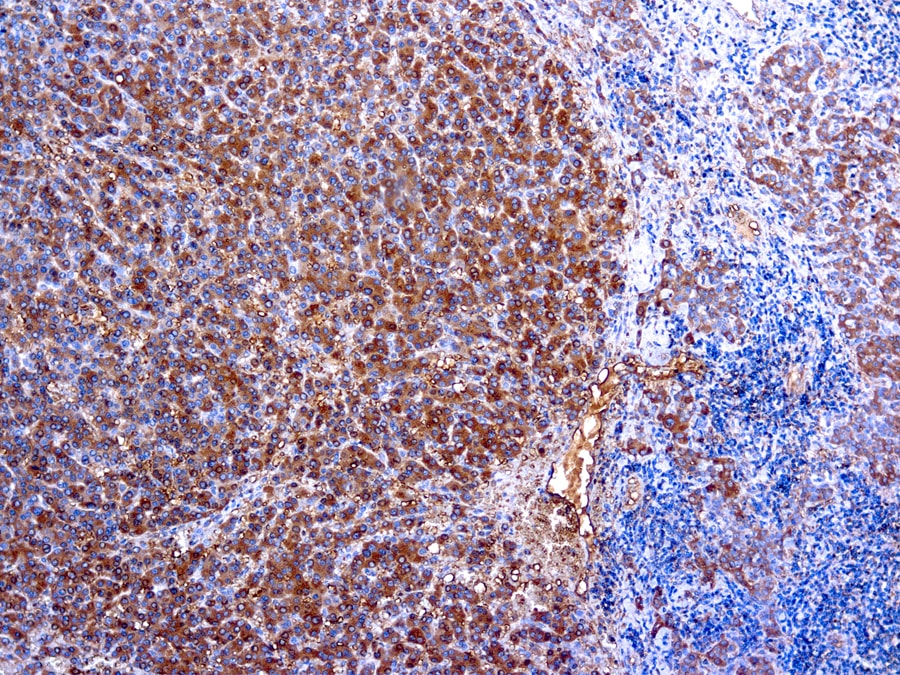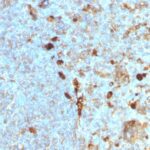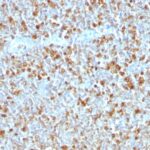Antibody (Suitable for clinical applications)
| Specification | Recommendation |
|---|---|
| Recommended Dilution (Conc) | 1:25-1:50 |
| Pretreatment | No Pretreatment Required |
| Incubation Parameters | 30 min at Room Temperature |
Prior to use, inspect vial for the presence of any precipitate or other unusual physical properties. These can indicate that the antibody has degraded and is no longer suitable for patient samples. Please run positive and negative controls simultaneously with all patient samples to account and control for errors in laboratory procedure. Use of methods or materials not recommended by enQuire Bio including change to dilution range and detection system should be routinely validated by the user.
alpha-1-Antitrypsin Information for Pathologists
Summary:
Acute phase plasma protein predominantly derived from liver which inhibits neutrophil elastase. Most abundant circulating serine protease inhibitor. Elastase digests lung tissue and is secreted by neutrophils during inflammation (Wikipedia). Member of serpin superfamily; homologous to alpha-1-antichymotrypsin. Clinical features
Notable Clinical Features:
Common genetic deficiency, see Liver nontumor chapter. Occurs in 1 per 2,500-5,000 newborns in Western Europe / USA. Incidence is highly dependent on Scandinavian descent within the population. Disorder due to folding errors (IUBMB Life 2009;61:1). Causes emphysema (Orphanet J Rare Dis 2008;3:16), chronic hepatitis (Hum Pathol 2012;43:753) or cirrhosis (Am J Gastroenterol 2008;103:2136, Clin Gastroenterol Hepatol 2012;10:575).
Common Uses By Pathologists:
Immunohistochemistry marker of alpha-1-antitrypsin genetic disease in hepatocytes. Also marker of normal histiocytes and hepatocytes.
| alpha-1-Antitrypsin General Information | |
|---|---|
| Alternate Names | |
| Molecular Weight | |
| 46.7 kDa | |
| Chromosomal Location | |
| [chr: CHR_HSCHR14_7_CTG1] [chr_start: 94378757] [chr_end: 94392703] [strand: -1]; q32.13 [chr: 14] [chr_start: 94376747] [chr_end: 94390693] [strand: -1] | |
| Curated Database and Bioinformatic Data | |
| Gene Symbol | SERPINA1 |
| Entrez Gene ID | 5265 |
| RefSeq Protein Accession(s) | NP_001002236; NP_001121176; NP_001121179; XP_016876859; NP_001121178; NP_000286; NP_001121173; NP_001121172; NP_001121175; NP_001002235; NP_001121174; NP_001121177 |
| RefSeq mRNA Accession(s) | NM_000295; NM_001127707; NM_001127701; NM_001002235; NM_001002236; NM_001127702; NM_001127706; XM_017021370; NM_001127700; NM_001127703; NM_001127704; NM_001127705 |
| RefSeq Genomic Accession(s) | NC_000014; NG_008290; NT_187601 |
| UniProt ID(s) | P01009 |
| PharmGKB ID(s) | PA35509 |
| KEGG Gene ID(s) | hsa:5265 |
| Associated Diseases (KEGG IDs) | Alpha-1-antitrypsin deficiency (A1ATD) [MIM:613490]: A disorder whose most common manifestation is emphysema, which becomes evident by the third to fourth decade. A less common manifestation of the deficiency is liver disease, which occurs in children and adults, and may result in cirrhosis and liver failure. Environmental factors, particularly cigarette smoking, greatly increase the risk of emphysema at an earlier age. {ECO:0000269|PubMed:1905728, ECO:0000269|PubMed:2227940, ECO:0000269|PubMed:2390072}. The disease is caused by mutations affecting the gene represented in this entry. |
| General Description of alpha-1-Antitrypsin . | |
| The antibody is specific against human alpha-1-antitrypsin. This antibody stains macrophages in human tissues and does not stain any other cell type. | |






Reviews
There are no reviews yet.